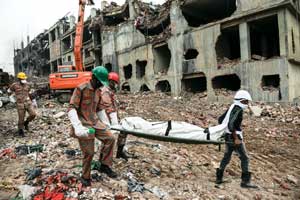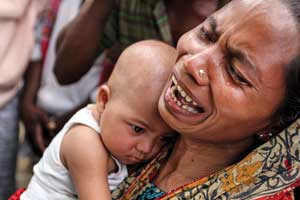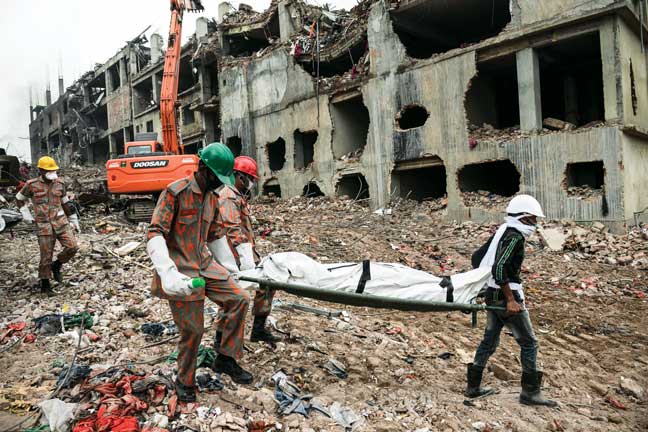
 In their Talking It Over series, Dr. James Read, director of The Salvation Army Ethics Centre in Winnipeg, and Dr. Aimee Patterson, Christian ethics consultant at the centre, dialogue about moral and ethical issues.
In their Talking It Over series, Dr. James Read, director of The Salvation Army Ethics Centre in Winnipeg, and Dr. Aimee Patterson, Christian ethics consultant at the centre, dialogue about moral and ethical issues.
Dear Aimee,
Welcome and thank you for agreeing to partner with me for Talking It Over this year. I need the conversation. I think God has wired people to work through topics together and I know from past experience that I can learn a lot from you. I thought for starters that I would ask you to help me understand the Rana Plaza catastrophe a bit better.
 Rescuers carry a body retrieved from the rubble of the Rana Plaza building (Photo: Ismail Ferdous, The Associated Press)
Rescuers carry a body retrieved from the rubble of the Rana Plaza building (Photo: Ismail Ferdous, The Associated Press)
On April 24, 2013, the multi-storey Rana building near Dhaka, Bangladesh, collapsed and killed more than 1,000 people—mostly women. It is believed to be the deadliest disaster in the history of the garment industry and the country's worst industrial accident.
The collapse in Dhaka was a massive human tragedy—everybody knows that. But there are so many other parts of the story that are unclear, such as whether it is right to describe it as an “accident.” I'm interested in what you have been thinking.
Jim
Dear Jim,
Thanks for welcoming me to the conversation.
I think the tragedy at the Rana factory gripped most of us because of the sheer size of the collapse and the huge number who were killed or injured. But an “accident”? It might be called an “accident” in the way that reckless driving is said to lead to road accidents. Perhaps no one intended to bring about the deaths of more than a thousand people. But everywhere I look in the news, I read about parties who should have seen this coming. A complex web of causation is being mapped out.
Initially, I viewed the story as someone who has purchased products sourced at the Rana factory. “What do you expect to get for a $10 T-shirt?” was a line I frequently read. It stung. I think that being ethically engaged as consumers is important. But I'm also discovering that preventing factory disasters in developing nations requires more than Westerners making educated purchases.
The garment industry may be fairly new to Bangladesh, but it employs four million people there and counts toward 80 percent of the nation's exports. It is “too big to fail.” It also depends on Western brands earning a tidy profit by relying on ultra-cheap production costs. Consequently, the government has been sloppy about regulating and monitoring factories and working conditions. The Rana factory collapse may have been massive in scale, but garment factory accidents are not infrequent in Bangladesh. There has already been a fire in another Bangladesh factory since Rana.
Determining how to act ethically gets complex when we look at the people most affected by this tragedy. Many Bangladeshi labour activists point out that working in the garment industry is the only way for women in Bangladesh to gain a level of economic independence. Boycotting clothes sourced in Bangladesh, they argue, will rob women of the chance to earn a living. Instead, they call upon consumers to hold brands and governments accountable for maintaining decent working conditions. They call it “jobs with dignity.”
What do you think it would take to provide Bangladeshi garment workers jobs with dignity?
Aimee
Dear Aimee,
Pope Francis made this the centre of his comment on the Rana tragedy. “Work gives us dignity!” he said. “Those who work have dignity, a special dignity, a personal dignity: men and women who work are dignified…. When society is organized in such a way that not everyone has the opportunity to work, to be anointed with the dignity of work, there is something wrong with that society. It goes against God himself, who wanted our dignity, starting from here.”
This statement challenges the idea that people are primarily “consumers.” As you said, the first reporting of this story encouraged us to ask ourselves whether we had been unethical consumers by buying the $10 T-shirt. I am part of The Salvation Army's International Moral and Ethical Issues Council and we put out a document on consumerism this year. Consumer decisions matter to me. But starting there feeds into a mentality that it's purchasing, consuming and using goods that is at the heart of economic ethics.
I think the Pope caught the biblical viewpoint better by saying that it is the human capacity to work—to labour in ways that add to the world and contribute to society—that comes first. Work is not a part of the penalty of sin; it's a part of what makes humanity flourish.
There are dangers in saying this, however. One is that we equate work with wages and conclude that people who are not paid (such as students and stay-at-home parents) are not really working. Another is suggesting that work of any kind enhances human dignity.
 A Bangladeshi woman holds her daughter and weeps (Photo: Palash Khan, The Associated Press)
A Bangladeshi woman holds her daughter and weeps (Photo: Palash Khan, The Associated Press)
I'm prepared to say that the garment workers in the Rana factory could have experienced a modicum of human dignity because their labours added to the prosperity of the world, their communities and their families. There's nothing inherently undignified about “low-skill” jobs. But when I learn that their employers ordered them to show up or lose their jobs when there were ample warnings that the factory would not hold up, when I learn that the people who died were paid less than $50 a month and had no life or health insurance benefits—to say that work gives people dignity becomes a cruel mockery. Better to say it robbed them of their dignity.
I don't see any simple formula that would have ensured the Bangladeshi workers' dignity, but it might have helped if they had been able to bargain collectively. In an eerily similar story, there was a fire in the Triangle Shirtwaist Factory in New York City in 1911 in which approximately 150 (women) garment workers died. The consequent public outrage resulted in workers banding together and advocating successfully for building safety codes and better working conditions. I'm no expert on unions—I was only a member for a few years and only on strike once—but I think they can help.
Maybe they would have helped in Dhaka. Is that hopelessly naïve or somehow wrong in principle?
Jim
Dear Jim,
I like the idea that our identities can't be reduced to those of producers and consumers. There's nothing wrong with producing and consuming as human activities. But it would appear that to regard people as mere producers or consumers is to regard them inappropriately.
Ironically, producers tend to be valued in direct contrast to how important their labour is to a company's profits. The brands that used the Rana factory found they could have their products manufactured more cheaply in a developing nation with a low cost of living and few enforced labour regulations.
Although it made little difference to their bottom line, they failed to provide a living wage and a safe workplace to those workers on whom their profits hinged. Sometimes it takes a tragedy like this one to alert us to the lack of dignity associated with certain working conditions in the developing world. Thankfully, since the factory collapse, some garment brands have recognized the need to raise these standards.
But at the heart of what we're witnessing is a lack of respect for the dignity of human work. You (and Pope Francis) draw attention to the central aspect of the dignity of work from a Christian perspective. It's first and foremost wrapped up in flourishing: we and others make the most of ourselves and engage in relationship with others by being God's creative creatures. We ought to value the labour of others not only because they make something we need. We ought to value their humanity by freeing them up to work meaningfully. We ought to value the work we do ourselves not only because we need to earn a living. Even if we were independently wealthy, most of us would work at something to realize our potential, to better ourselves and our communities, I suspect.
So it's important to provide a safe work environment, a living wage, a fair work schedule and the possibility for a union voice to protect those parties who are vulnerable in our global economy. But this is just the low-water mark when it comes to honouring the dignity of human work. It's wonderful that global connections mean women in Bangladesh have new opportunities to work. It will be a better thing when these women are viewed not first and foremost as garment manufacturers, but as people like us whom the economy is there to serve.
Aimee










Leave a Comment